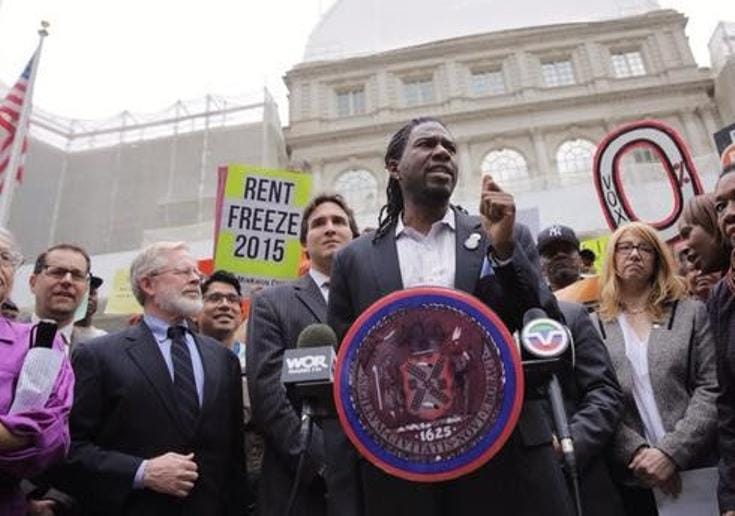Councilmen Jumaane Williams & Mathieu Eugene Join Other Lawmakers To Call For Affordable Housing Reform & Repeal Of Urstadt Law


Led by Councilman Jumaane Williams and Manhattan Councilman Ben Kallos, a bevy of legislators and advocates gathered on the steps of City Hall today to call for affordable housing reform, including a rent freeze on rent-regulated apartments and the repeal of a state law that transferred the power to pass local rent laws from the city to Albany in 1971.
Held the day before new rent guidelines go into effect (which will raise rents one percent on one-year leases and 2.75 percent for two-year leases in rent-stabilized apartments), the press conference included lawmakers railing against a litany of problems with affordable housing in the city (and the lack thereof) – including that thousands of rent-regulated apartments have been lost across the five boroughs due to steady rent increases.
Legislators said that while the new rent guidelines are at a historic low, any increase at all is a financial burden to thousands of tenants struggling with years of rent hikes and displacement pressure. Lawmakers and other advocates pointed out that in the history of the Rent Guideline Board, board members have never voted on a rent freeze.
“New Yorkers deserve more affordable housing and economic security to let them stay in rent-stabilized apartments,” Williams, chairman of the Council’s Housing and Buildings Committee, said in a press release this afternoon.
Kallos agreed.
“Many New Yorkers need a rent freeze to continue to live and work in our city,” Kallos said in the same release. “While the rent increases on rent-stabilized units starting on October 1st are at an historic low, we still need to correct for disproportionate past burdens on renters by renewing the call for affordable options and a rent freeze. Only 25% of units are affordable to low-income residents, a number that continues to decline. We must fight to ensure that New Yorkers can continue to live and work in the city they call home.”
The legislators also pushed for the repeal of the 1971 Urstadt Law, which gave Albany the power to control the city’s rent regulation laws and was passed at a time when advocates were calling for greater oversight of the city’s housing laws while the city was rocked by a financial crisis. However, after the law passed, lawmakers have for decades attempted to overturn it – but no one has yet been successful. City lawmakers and advocates have argued that city control over would pave the way to more affordable rents and that preventing the city from being able to strengthen its rent regulation laws has come at a great detriment to the nearly 2.5 million tenants in rent-stabilized or rent controlled apartments – and has occurred in part because the real estate industry has poured money into the coffers of upstate lawmakers who don’t have to contend with constituents in New York City.
“A full repeal of Urstadt would not only help stop the permanent loss of more than 150,000 rent-regulated units every year, but would fix a broken system that has allowed upstate districts who have no rent-regulated tenants decide the fate of our city’s renters,” Williams said. “Once this law is repealed, we will be able to make a serious impact on the affordable housing crisis that has plagued our city for far too long.”
Councilman Mathieu Eugene too stressed the need for better protection of affordable housing.
“There is truly a major housing crisis in New York City,” Eugene said in the press release. “Every rent increase that takes place makes it increasingly difficult for tenants in rent-stabilized apartments to continue living in this city. It is wrong that so many good, hard-working people are faced with the possibility of having to move away from relatives and friends – not to mention the neighborhoods that they love and cherish – due to the soaring cost of rent. We need more affordable housing now, and I strongly urge the state legislature to ban the Urstadt Law.”
While Assemblyman Richard Gottfried, who represents parts of Manhattan, told the New York Observer today that he thinks “there is more momentum this year than ever before” to overturn Urstadt, the repeal is in no way a done deal. City leaders, including Mayor Bill de Blasio, are hoping that Democrats, who are seemingly more supportive of the repeal than their Republican counterparts, will hold the majority in the Senate, thereby paving the way for the overturn of Urstadt.
This, however, remains to be seen with what transpires in the November general election, as well as what will happen with the Independent Democratic Conference. The IDC is a group of five Democrats, led by Bronx Assemblyman Jeff Klein, who have clashed with their mainstream Democratic peers and have instead helped the Republicans govern the state Senate. Governor Andrew Cuomo (who has not pushed for a repeal of Urstadt, though he has criticized it in the past) negotiated a deal this year to get the IDC to align themselves with the Democratic Party when they return to Albany in January.
“The Urstadt Law prevents the city from making changes to the way the Rent Guidelines Board operates,” said Jaron Benjamin, executive director of the Met Council on Housing. “Mayor de Blasio and countless Council members supported a rent freeze, but the RGB focused on faulty math because we have to wait on the state legislature to make the change. Tenants are suffering and their representatives have their hands tied-this isn’t right.”
Photo by William Alatriste/NYC Council.



